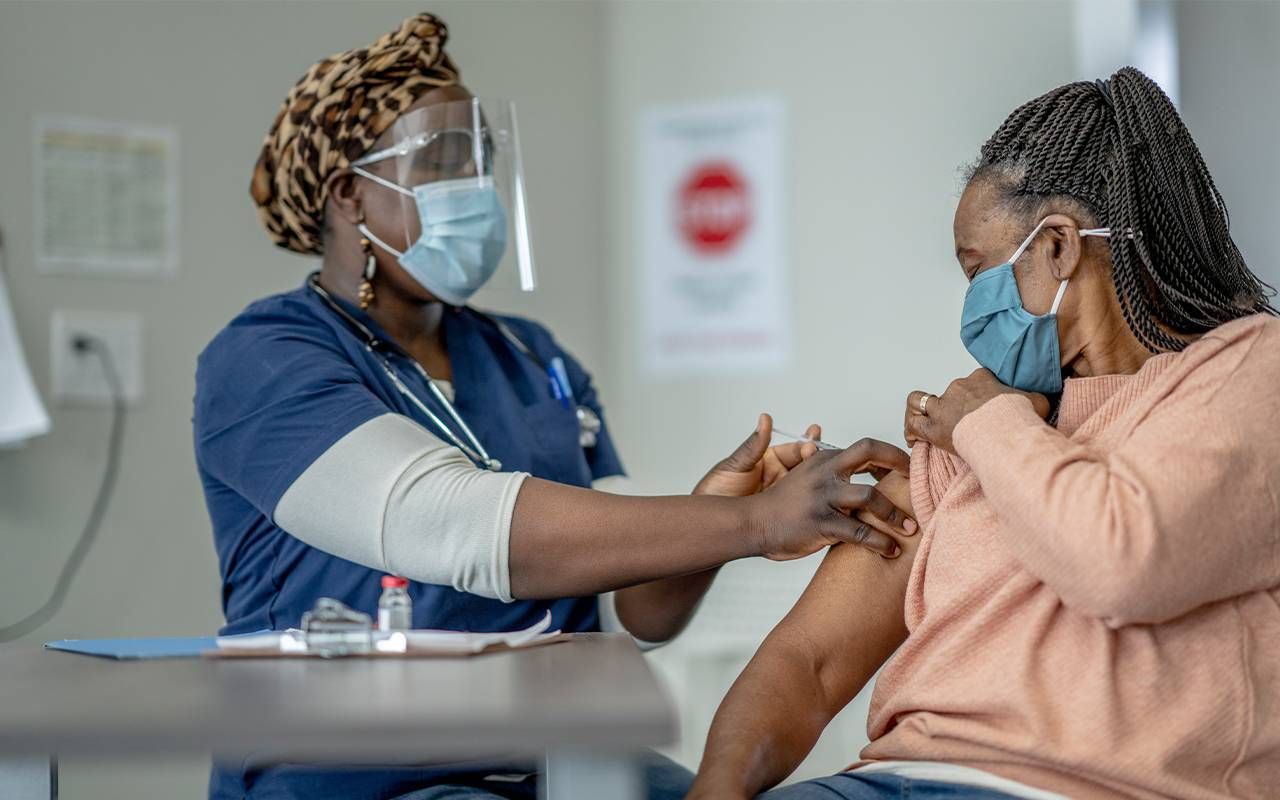Vaccine Side Effects Are No Fun, But What Are the Real Risks?
Beyond COVID-19, we look at the most common vaccines recommended for people over 50
There is overwhelming evidence that vaccines help us avoid contracting, spreading and succumbing to several serious diseases. It can be vital for people over 50 to stay up to date with vaccines, yet many of us do a poor job at it.

Complacency and busyness are common reasons, but another big one is the fear of vaccine side effects. Of course, there's always a risk of experiencing side effects with any vaccine, but how serious are most side effects, how common are they, and what health risks do they pose compared with not getting vaccinated?
Complacency and busyness are common reasons, but another big one is the fear of vaccine side effects.
To answer those questions, we spoke with a pharmacist, a vaccine expert from the CDC and a 79-year-old who experienced a moderately severe and rare side effect.
What Vaccines Are Recommended for People Over 50
You probably didn't know that the Centers for Disease Control (CDC) recommends 14 vaccines for adults over 50.
Don't worry, though — you probably got most of them when you were young, and you don't currently need to worry about getting boosters or newer versions because they still offer a high degree of protection.
Others may be recommended only for people at higher risk, such as frequent travelers, health care workers, and the immunocompromised. For most Americans over 50, four vaccines should be on your radar:
- The COVID-19 vaccine
- The influenza vaccine
- The Shingrix vaccine for zoster (more commonly known as shingles)
- A combination vaccine for tetanus and diphtheria (td or tDap)
However, because the prevalence of diseases is ever-changing, and the FDA approves safer and more powerful new vaccines from time to time, it's a good idea to use the CDC's online Vaccine Quiz to find out which vaccines are recommended for you.
How Effective Are Vaccines?
We asked Dr. Ram Koppaka, Associate Director for Adult Immunization at the CDC, how effective its recommended vaccines are.
Equally important is the second type of protection vaccines offer: Lessening the severity and duration of an illness if a person contracts the target disease despite being vaccinated.
"People like to hone in on specific numbers," he said, "but the reality is that I can't give you one number that applies across the spectrum of vaccines. Recommended vaccines are highly effective, each in their way."
Vaccines provide benefits in two different ways. The first type of protection they offer is preventing the target disease, and this is where effectiveness can vary the most.
For example, getting an annual flu shot lessens your risk of coming down with the flu by 40 to 60%
The Shingrix vaccine, on the other hand, prevents shingles in over 90% of fully vaccinated adults with normal immune function. In addition, the tetanus vaccine is so effective that only 30 cases are reported annually nationwide — virtually all of which are among the unvaccinated.
Equally important is the second type of protection vaccines offer: Lessening the severity and duration of an illness if a person contracts the target disease despite being vaccinated.
Again, using the flu vaccine as an example, Koppaka said, "The flu vaccine reduces the incidence of influenza by 40 to 60%, but it is extraordinarily effective at preventing hospitalization and death from influenza."
Indeed, a 2020 meta-analysis found that vaccinated adults, especially older adults, were less likely to die from the flu and all causes. The authors speculated that the vaccine's positive effect on inflammation throughout the body might be why. This is also the case with the COVID-19 vaccine and boosters.
In a graph created by the New York Times using data from the CDC, the latest information shows the death rate among unvaccinated individuals is six times higher than among the fully vaccinated, and that's down considerably from a factor of more than 20 when the pandemic was at its peak.
What Kinds of Risks Do Vaccines Pose?
The protective benefits of the CDC's recommended vaccines are undeniable. However, they also come with the risk of side effects. We spoke with Dr. Brigid Groves, Senior Director of Practice and Professional Affairs for the American Pharmacists Association, to learn more.
"This is something important for patients to ask about; what are the risks and the benefits, not only for vaccines but for all medications," Groves said.
She adds, "Those vaccines on the CDC schedule have already gone through a very rigorous testing schedule, both in terms of effectiveness and risk of side effects, and are considered extremely safe."
Both Groves and Koppaka explained that the vast majority of vaccine side effects are minor, such as pain and redness at the site of the injection, headache, chills, body aches, and mild fever, and those symptoms usually pass within 24 to 48 hours.
While more severe side effects are rare, they aren't unheard of, but there are a couple of ways to lower your chance of experiencing them. First, it's essential to fill out those pre-vaccination medical history questionnaires as wholly and accurately as possible, especially regarding other medications you're taking and any allergies you have.
Groves said that your pharmacist or health care provider will review this ahead of time "and know whether a particular vaccine is appropriate for you, given those conditions."
"I've been administering vaccines for over ten years and have never encountered a severe reaction."
Sporadic cases of more severe side effects, such as breaking out in a rash or having difficulty breathing, typically happen within 15 minutes of receiving a vaccine. That's why it's essential to stick around after getting your shot — the staff trained to administer vaccines are also trained in dealing with those severe reactions.
But, Groves noted, to stress how rare these types of side effects are, "I've been administering vaccines for over ten years and have never encountered a severe reaction." Rarely, strange reactions can still occur even when those precautions are taken.
That was the case for Alretta Skellenger, a 79-year-old retired school teacher living in Walker, Minnesota. She told us that about 10 hours after receiving her initial COVID-19 vaccine, "I woke because my lips were shaking. The rest of my body soon followed that."
The shaking was accompanied by light-headedness and fatigue and lasted for about an hour and a half. "I had had similar shaking in the past, from other things, but I didn't know why," she said.
Then, with the help of a pharmacist friend, Skellenger determined that she had an allergy to a substance used as a carrier in certain medications, including the COVID-19 vaccine.
We asked Skellenger if she was glad she'd gotten the vaccine or if it had been more trouble than it was worth. "Oh, I'm pro-vaccine," she told us, and she's hoping one of the newer versions of the COVID-19 vaccine will use a carrier she's not allergic to so that she can be fully vaccinated.
Not Getting Vaccinated Is The Real Risk
If you're researching the risks and benefits of vaccines, it's imperative also to research the diseases they're meant to protect against. "The risks of these diseases are real," Groves warned.
"We often don't realize their seriousness because the vaccines have existed for so long we don't see them in society. This can cause a lax attitude, or even a larger fear of the vaccine than of the condition it's aiming to treat," she said.


